-
LET THE SUN SHINE IN/UN BEAU SOLEIL INTÉRIEUR (Claire Denis 2017)
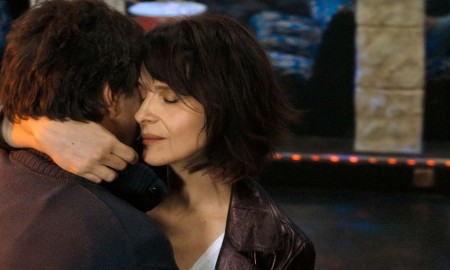
JULIETTE BINOCHE IN LE THE SUN SHINE IN/UN BEAU SOLEIL INTÉRIEUR
CLAIRE DENIS: LET THE SUN SHINE IN/UN BEAU SOLEIL INTÉRIEUR (2017)
Sad comedy of an older woman seeking love
Though she somewhat returns to the obsessive female love territory of her 2002 Friday Night, French master Claire Denis takes a different tack from more serious films like Beau Travail (1999), White Material (2009) and 35 Shots of Rum (2008) in this new film, whose lead is masterfully possessed by Juliette Binoche. Un beau soleil intérieur follows a 50-something woman - a very beautiful one, obviously - in her "search for love" with various men. It's a tragicomic series of misadventures, delineated by many sexy intimate closeups by regular dp Agnès Godard, but also by comically clumsy meandering dialogue that dramatizes the fumbling search and gently satirizes the comic war, or dance, of the sexes. And for this unusual, highly verbal, aspect of the film, Denis has collaborated with novelist and playwright Christine Angot, who has provided many of the devastatingly silly, or cruel, lines. And Isabelle (Binoche's character) is silliest of all, witness her long final session with a fortune teller (Gérard Depardieu). As many have noted, this is both Denis' most lighthearted film (despite its sad side) and her talkiest.
That ending says this: Isabelle has no idea how to choose a man, and she has not found an appropriate one. But she's still ripe for the game, and playing it requires doses of cockeyed optimism. Depardieu's seer hasn't a clue, and neither has Isabelle, and so the plotline isn't really quite leading anywhere, neither plumping for nor quite rejecting any of the unsuccessful mates - which is, after all, rather kind to men in general, offering some sympathy for even the worst of them. It begins with a stuckup banker, Vincent (the very smooth, subtly repulsive Xavier Beauvois), in the first, most realistic sex sequence, which ends with neither of them satisfied. Then she spends an evening with a married, self-absorbed young actor (Nicolas Duvauchelle, very cool and sexy), and she is tremendously excited by the idea of him. At her place, he is recalcitrant. He asks for a drink, then when offered it, wants to leave. Se coaxes him back, and he stays. Next morning he explicitly wishes it hadn't happened, insisting he preferred the "before." The rapport is ruined, if there ever was any, and yet the nature of the danger is that the attraction still hovers on both sides, nudged by the stuttering talk.
She goes to bed with her ex-husband - who tells her their ten-year-old daughter says that when she's with her, Isabelle cries every night, and that's bad for her - while Isabelle is turned off by something he does in sex that she finds false and artificial, so that encounter gets cut abruptly short, a pretext perhaps. Several other men follow, one a sympathetic artist colleague (Bruno Podalydès); another a beautiful, sad-faced stranger (Paul Blain) with whom she has a lovely dance to Etta James' song, "At Last." Is that the best it can ever be, an iconic torch song and a swoony dance with a stranger? Or does this only symbolize cinema's inability to capture love in anything but iconic images?
Binoche is wonderful through all this, sympathetic, needy yet never pathetic, occasionally looking almost her age perhaps, but frequently having moments of happiness, hope, or desire where she glows and radiates like the prettiest of twenty-somethings. She is something, and she never seems to be straining. It's all completely natural, possessed, from within, a career best performance and a triumph for the reputation and promise of that under-appreciated group, actresses of a certain age.
What these connections all have in common is that none of them is quite right, and that they often contain random droll moments of pretension, misapprehension or malapropism. LIfe is alarmingly frustrating and silly. And yet the point is, that in spite of that, the urge is still always there. Throughout, Denis asserts her style and mastery by the rhythm she gives the scenes and the way she transitions from one to the next; by the extraordinary subtle, flickering balance between the sad and the droll. She has faced danger and transformation in films like Beau Travail or The Intruder and here, she's not moving toward some rom-com plotline resolution. This is underlined in an original fashion by the ending session, over closing credits, with the kooky, meandering "seer," Depardieu fluently improvising, riffing, inventive nonsensical bullshit about Isabelle's men and her futures with them, all of whom he sees as positive - or perhaps not. Nothing is certain, and nothing is concluded. And that's bravely life-affirming.
Let the Sunshine In/Un beau soleil intérieur, 94 mins., debuted at Cannes 18 May 2017 in Directors Fortnight, opening in France 27 Sept., AlloCiné press rating only a good 3.5 (70%), but top marks from Cahiers, Les Inrocks, Libération and Humanité. in at least 26 international festivals including Toronto, New York and London. Watched 29 Oct. 2017 in Paris at Cinéma Le 3 Luxembourg.
Last edited by Chris Knipp; 10-12-2022 at 05:20 PM.
-
THE MEYEROWITZ STORIES (NEW AND SELECTED) (Noah Baumbach 2017)
NOAH BAUMBACH: THE MEYEROWITZ STORIES (NEW AND SELECTED) (2017)
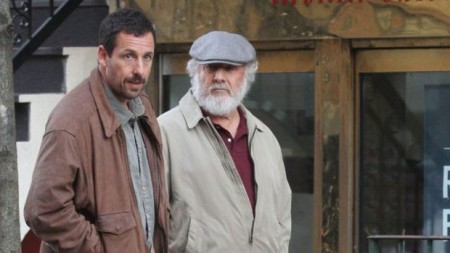
ADAM SANDLER AND JUSTIN HOFFMAN IN THE MEYEROWITZ STORIES (NEW AND SELECTED)
Baumbach's shot at maturity and warmheartedness
One reviewer, Jessica Kiang, says it evokes "so many other media," theater, short story, TV, she doesn't know why it's a film. She puts her finger on something. This is scattershot, fragmented, and it does that in a sincere and not unsuccessful effort to adopt a warm and comprehensive point of view. This is also perhaps the former Wes Anderson writer's most Wes Anderson film.
It is mainly a decent attempt to be not dry, witty, and cruel like The Squid and the Whale (still an entertaining and watchable film), but, only 12 years later, to be about being an adult, having children, learning to forgive one's father and face his mortality, and so on, and so forth. The "stories" faceting helps to do that, but leave one with a messy, shattered vision. Maybe this is a transition, and that would be from cleverness to something like wisdom, a harder mark to strike.
There are two brothers, the financially successful Matthew (Ben Stiller, very fast on the ball here), and Danny (an unusually straightforward Adam Sandler), once interested in being a musician, but never having done anything, really. Their father Harold (Dustin Hoffman, also straightforward and fine), who was married four times, is a sculptor, but whether he was any good is a question the sons must face. At any rate he taught for 33 years at Bard, where Danny's daughter, Eliza (Grace Van Patten) studies and is a "promising filmmaker." Or does she just partake of the pretension of the younger generation and its ease with provocation, since her little ilms are comic-pornographic? There is also Jean (the surprising Elizabeth Marvel), who was always ignored but does her duty of being present nonetheless and has one speech of protest.
A storyline that strikes home for some of us is the one about work, calling, and worth that finds Harold's career highpoint in a box in storage at the Whitney Museum because yes, the museum indeed once did buy one of his sculptures. And yet Harold, struggling with age and failing powers, deceives himself into thinking inclusion in a Bard faculty show is a "retrospective" or that a photo album of his sculptures will lead to one, and that will give his career a boost. This is about male ego and self-deception but also about sons coming to terms with the real size of their once enormous and threatening and detestable fathers. Is Harold really a very good artist who just didn't "play the game" like his contemporary L.J. (Judd Hirsch), who's having a show at MoMA, or is he just kidding himself? But he's obviously at times a pretentious twat, as when he says things like "I find Maugham to be skillful without being an artist. . ." His simplistic and pompous little dismissals of everybody show him to be an ass, but somehow they have no bite. This script is full of loving detail. It's satire is forgiving. So is its low keyed piano score - forgiving of the audience.
Being, wisely, about what people are rather than what they do, the film isn't heavily plot-driven, and that's a good thing, though it has solid plot elements, especially revolving around hospitals for Harold, who has a life-threatening crisis, and for Danny, who faces up to the need for a hip replacement. Matthew takes care of it, even to a private room, and this is one of numerous sequences about the brothers' rapprochement. Any rapprochement with Harold is fraught because however diminished, he remains as annoying as he ever was. In an exaggeratedly frank speech by Danny at the faculty show, which Harold can't attend because he's in the hospital, Danny says he hopes his father was a good artist because if he wasn't, "he was just a prick."
This strikes a false note, due to Sandler's unusually straightforward delivery here. This is a new Sandler, to go with the new, more humane and serious Baumbach. This is far from his wittiest film and as Kiang's comment hints, there are ordinary, sit-com-ish elements, but there are home truths about growing up that make the less sprightly texture seem worthwhile. This is all about the three main males as finely played by Hoffman, Sandler, and Stiller, but there are other good actors including Candice Bergen, Emma Thompson, Judd Hirsch, even a cameo by Sigourney Weaver that becomes one of several recurrent jokes that help keep the tone light.
This was at Cannes, then the NYFF Main Slate, but released on Netflix 13 Oct. Watched online, but in Paris. Also showing in US theaters, including IFC and Landmark. Metacritic rating 79%. There's a lot to cover here in a thumbnail review. It takes a while to get going, but when it does, it feels warm and kind, and you appreciate its sincerity and goodwill. And yes, Dustin Hoffman and Adam Sandler are good even if Ben Stiller is the closest to a grownup, among the males anyway. Watched 4 Nov.
Last edited by Chris Knipp; 11-05-2017 at 06:43 AM.
-
LADY BIRD (Greta Gerwig 2017)
GRETA GERWIG: LADY BIRD (2017)
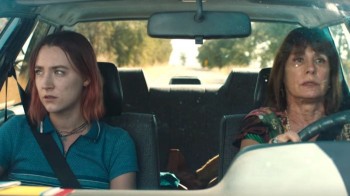
SAOIRSE RONAN AND LAURIE METCALF IN LADY BIRD
Loving and leaving Sacramento in a sparkling if overstuffed debut
Greta Gerwig has been an actress with the mumblecore directors Joe Swanberg and the Duplass brothers; and, with growing fame, with other directors like Jason Winer, Alison Bagnall, Woody Allen and Whit Stillman. Then with mutual profit and success she became a muse for Noah Baumbach, contributing a lot to the writing of the Baumbach films she starred in as she had to earlier screenplays (in fact she had focused on acting originally only because she couldn't get into playwriting MFA programs). Now at last after over a decade in the business, she has become a writer-director, creating but not acting in her own loosely autobiographical tale. It's a generally lighthearted feature that tries to say a little too much but is fun and amusing and not without its moments of heartache and shock. This movie is charming, but flawed. It won't assume a place among classics of the recent past like Heathers, Sixteen Candles, and The Virgin Suicides. But it seems a good expression of the ebullient spirit of its maker and it has some things to say about early millennial ambition in the urban boonies and some of the tests faced by a California girl in her late teens in 2002.
Lady Bird focuses on senior year at a Catholic high school in Gerwig's native Sacramento, California, that crucial moment in a bildungsroman before its protagonist escapes to the great world where she must go to make a name for herself. Though to start out she's not going off to be a star in any particular field of the arts, only choosing to go to study at an East Coast college and not a local California school like, most obviously, UC Davis, which for this young woman would be death. After all, it started life as an agricultural college. This girl really wants New York, and she knows it.
But she's not New York, and she's not shrewd or sophisticated. She a Sacramento girl. The problems Christine "Lady Bird" McPherson (Saoirse Ronan) encounters are several. In a school musical production she gets involved with Danny O'Neill (Lucas Hedges), and they have a sweet affair. He "respects" her and loves her so much he doesn't want to touch her breasts. At prom night another reason for his reticence emerges: he's actually gay. That ends that. Hedges is an actor much in demand who was Oscar-nominated for his supporting role in Manchester by the Sea; not surprisingly, he's touching and adorable in this role, which doesn't end with the couple's abrupt breakup but has several appealing followup scenes. Next, via a coffeeshop job, Lady Bird finds her way to the cool, sophisticated Kyle (Timothée Chalamet, another topnotch young actor, costarring in the upcoming Call Me by Your Name), who's also apparently rich. But there is a misunderstanding that makes her feel cheated when she thought they were both losing their virginity together, and it turns out Kyle has been with "about" six girls: he doesn't even keep count. This portrait of Lady Bird's amorous and sexual path is limited but vivid.
With girlfriends it's complicated too. Her best friend is the plump, smart Julie (Beanie Feldstein), who's good in math (as Lady Bird would like to be but definitely isn't) and in love with the handsome math teacher, Mr. Bruno (Jake McDorman). But our heroine is a snob, or a climber (also not averse to cheating on tests or stealing a grade book), and gets into an "in" set by pretending to be rich and pals around with stuck-up Alpha rich girl Jenna (Odeya Rush). A major asset of Danny's was that his grandmother lived in her favorite house in the poshest neighborhood of Sacramento. It's not a tough decision to choose Thanksgiving at Danny's grandma's over at her parents. In justification of this trend, Lady Bird's family is poor, and rising beyond it is going to take maneuvering. Her long-depressed father (Tracy Letts) loses his job in the tech industry, and finding another is tough. Her mother (Laurie Metcalf) works in a psychiatric hospital.
A major theme is Lady Bird's conflict with her mother, whose constant criticisms get in the way of her showing her underlying love. This movie is over-busy, and though it constantly touches on this theme, it never emerges with the force it seems to deserve. (On the other hand, it contains many choice moments one wouldn't want to see cut.) Daddy comes through smelling like a rose, kindly filling out the student loan applications that are crucial to Lady Bird's escape, and also when she does leave, slipping into her suitcase thrown away letters that show her mother's love. The latter is a compensatory afterthought, more telling than showing, but fits in with Gerwig's omnibus writing style.
As Christine "Lady Bird" McPherson, Saoirse Ronan delivers a fine and dedicated performance that yet has lightness. Ronan has a severe presence, and may seem a very odd choice as a stand-in for the beautiful and bubbly Gerwig, who is luminous where Ronan seems drab and flat. But Ronan is also simply very, very good. Even if the actress lacks Gerwig's beauty and bubbliness. some of the other major qualities are there, and Ronan exudes an energy here that eventually gives her too a kind of glow of her own. Nonetheless as Richard Brody says in his New Yorker essay, this film is tight and on the surface conventional and lacks the exhilerating improvisatory feel of many of the ones Gerwig has previously acted in and helped write.
The main thing is, this happens in Sacramento, to which this is a hail and farewell. Lady Bird, doubtless like the filmmaker, loves Sacramento. When Lady Bird finally gets her driver's license, driving around the town and admiring its sights moves her deeply . But this flat, hot town, original home of Joan Didion, who escaped to places like Malibu and Manhattan, is too limited for such an ambitious young person. For college she must go to New York, or, if not there to a college in Connecticut or New Hampshire, "where writers live in the woods."
This isn't much of a sketch of intellectual development. Lady Bird goes to a Catholic high school. One nun does speak of her love of Kierkegaard. And her second boyfriend has gloomy, left-leaning political ideas. Meanwhile it's post-9/11 and Bush's wars are getting going.
On the one hand, Gerwig tries to tell us too much information. Some elements never seem clear, like Lady Bird's brother (Jordan Rodrigues) and sister, apparently adopted? On the other hand, despite the lack of subordination and inclusion of undigested details, they do give the movie a particularity that others of the kind often lack. Gerwig is irrepressible. That is part of the charm. And in this lean season this movie is a boon and contains much that can be savored.
Lady Bird, 94 mins., debuted at Telluride (1 Sept. 2017) and Toronto (8 Sept.), also was at the New York Film Festival (8 Oct.) and in 14 other festivals. It opened in the US 3 Nov. 2017.
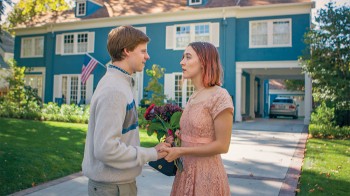
HEDGES, RONAN IN LADY BIRD: AT DANNY'S GRANDMA'S HOUSE
Last edited by Chris Knipp; 11-23-2017 at 07:24 PM.
-
LAST FLAG FLYING (Richard Linklater 2017)
RICHARD LINKLATER: LAST FLAG FLYING (2017)
[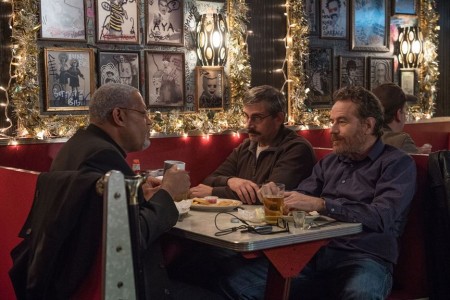
FISHBURNE, CARREL, AND CRANSTON IN LAST FLAG FLYING
Ritual and repetition
Last Flag Flying, based on a book, is a passionate mulling over of the issues of war and service, death and ritual, but it's a mulling over that goes on a little too long. The quality of the three main performances never flags though, till the symbolic last flag is not flying but folded, triangle by triangle, and handed over to the bereaved. This story is described as a kind of sequel to the Jack NIcholson vehicle The Last Detail, but not really.
Linklater is a listener, A.O. Scott recently wrote, certainly true of his "Before" trilogy with Delpy and Hawke, and of this. In which case he expects us to listen too, and this works very well for those with the patience. Mine flagged, but I never lost respect for the seriousness of the endeavor. The talkers are three men following the coffin of a young marine killed in Iraq, and the three were together in Vietnam. Larry 'Doc' Shepherd (Steve Carell) was only 19 then, and it's his son who joined the Marines and got killed. Doc comes after years and finds two old buddies to keep him company when he seeks his son's body - which, for reasons we will learn, he wants not to allow to be buried at Arlington National Cemetery with full military honors, but next to his late wife in New Hampshire, where he was imprisoned and now lives and works.
The actors have very different styles that match pretty well their very different characters. Doc is recessive, tight-lipped. His opposite is the alcoholic Sal Nealon (Bryan Cranston), who sleeps at his own failing bar. Cranston is a darned good actor when he has the right role, and the over-the-top, loudmouth, in-your-face Sal is such a role. He exaggerates everything, but he gets it all out there. The most complex character, though he gets only limited opportunity to show it, is Reverend Richard Mueller (Laurence Fishburne), who was as loud and violent and dangerous as Sal back in the day, but now is a staid black preacher whose fire comes out only in his sermons. Sal and Doc first come on Mueller in full voice before his congregation. It's an elegant, restrained display of the gospel style. Off the pulpit Mueller is stiff, clean-living, and godly. Later, when the men start squabbling, the old profane Mueller comes out. But this too is restrained. Fishburne is as well-modulated an actor as Cranston is a broad-brushed one, but both performances work and offset each other.
Carell hardly even seems to be acting, but that of course can be the best acting of all. He has shown his mettle in a variety of unexpected roles in recent years, in films like Foxcatcher, The Big Short, and Battle of the Sexes. He does the job that's thrown at him, and his neutrality provides a sounding board for the more boldly drawn emotions of Sal and Mueller, till you realize Doc has the deepest feelings and most impressively absorbed grievances. But Carrel remains a little too opaque for that to come through as powerfully as it should. Grievances because Doc is the one who spent years in the brig (he was Navy, they Marines) for some misbehavior they were really all three involved in. Their misbehavior included using up morphine needed for the wounded. And so we learn that Mueller's new life began with desperate addiction and alcohol. Then recovery led to unmitigated desperation and church and meeting his wife there, and his new calling - a classic trajectory.
At times this movie, co-written by Linklater with Darryl Ponicsan, adapting his novel, is quite content simply to preach to us or lecture us. Thus it explains that the Iraq war is as futile and based on as flimsy a premise as the war in Vietnam. But, somewhat contradictorily, it also tells us, or the men do, that it's always honorable to serve one's country as a soldier, and the Marine motto, "Semper Fi," means something. Of course things are complicated, very much so. This is all about compromises. Doc must honor his son, without accepting the war he was in. He accepts the honor of seven soldiers accompanying his son's coffin to the grave but insists on a civilian burial place. Arguing over this is the protocol-conscious Colonel Wilits (Yul Vazquez). Watch Wilits scream at Lance Corporal Washington (the excellent, extremely watchable J. Quinton Johnson) in full Marine profanity not to let the boy's father bury his son in his graduation suit, but properly, in his Marine dress blues. Washington briefly but crucially provides something else to listen to: an inside voice on what happened to Doc's son.
Ritual and formality are things that become crucial in times of most suffering: remember Emily Dickinson's words, "After great pain, a formal feeling comes." For its earnest pursuit of these matters and for its committed performances I respect Last Flag Flying immensely. But as a watch and a sit it has its longeurs. There's too much loading and unloading of the coffin, and too much shifting of vehicles and climbing on and off Amtrak by the three men. If Richard Linklater is a listener, he is not a trimmer. We can see that in his celebrated Boyhood, which was made by a process of accretion. Last Flag Flying gets to the end, and just ends. But it's over two hours long, and so many of its points are stated more than once. A filmmaker is never just a listener: he must choose what he, and thus we, are going to listen to, and must give it a theatrically effective shape. That never quite happens here.
Last Flag Flying 124 mins., debuted 28 Sept. 2017 at the New York Film Festival, where it was the Opening Night Film, and showed at 16 other festivals, mainly domestic, but also London, Mumbai, Vienna, and Mar del Plata. US theatrical release 3 Nov. 2017. Metacritic rating 65%, lowered by views of those who think it too labored, stiff, and dreary, despite the good acting, and too lacking, as I've said, in a strong dramatic structure.
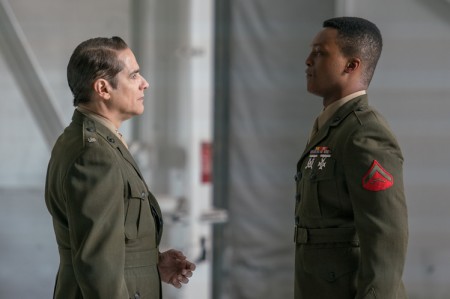
YUL VAZQUEZ AND J. QUINTON JOHNSON IN LAST FLAG FLYING
Last edited by Chris Knipp; 11-23-2017 at 07:00 PM.
-
THELMA (Joachim Trier 2017)
JOACHIM TRIER: THELMA (2017)
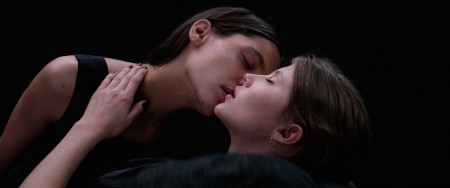
OKAY KAYA, ELLI HARBOE IN THELMA
Girl becoming
This is Joachim Trier's fourth feature. The first two, Reprise (2006) and Oslo, August 31st (2011), in his native Norwegian, coauthored with his constant collaborator Eskil Vogt, were dazzlingly entertaining and emotionally compelling studies of brilliant, troubled young men, in both instances played by the efforrtlessly riveting Anders Danielsen Lie. They're two of the best films of the decade. Louder than Bombs (2015), the third, branching out in a new direction, was a disappointment. In English, with a cast of well known, somewhat oddly assorted actors including Isabelle Huppert, Gabriel Byrne, David Strathairn, and Jesse Eisenberg, it focused on a family's efforts to cope with the death of one among them. It felt false. Most of the scenes, except a few raw, vivid ones with a teenage family member, played by newcomer Devin Druid, seemed telling rather than showing.
The new one is more of a success, beautiful, as assured as the first ones, and haunting in its way. But one still wonders about the direction Trier is going and wishes he'd get back to the authenticity of his first films. Thelma, a film located back in Norway again, plays with genre and story lines so much, being "false" doesn't even figure (I guess). It's a beautiful, arty, creepy film, mixing horror, tasteful lesbian love, coming-of-age, and superpowers, all embodied in a young college student with a strict Christian background. All this is a lot for the doe-like, slightly feral Eili Harboe, who plays Thelma, to carry, and we have to accept a little - no a lot - on faith that all this is happening to her. It's bestowed upon her by the sheer power of cinematic technique, the nice staging, handsome cinematography, measured editing, atmospheric but subtle music, and restrained use of special effects - often as simple and old-fashioned as showing a character in one shot, then following with another shot of the same space with the character missing, to suggest he's been made to disappear by some magical power. Yes: the magical power of old-fashioned cinema trickery.
By way of background is a striking early scene when the six-year-old Thelma (Grethe Eltervåg), prettily decked out in a pink and blue outfit, is taken hunting out in the snow by her stolid, from the first somewhat scary father, known by his first name, Trond (Henrik Rafaelsen) when Trond is about to shoot a deer, and turns his rifle toward little Thelma instead. Happily Trond shoots neither the deer nor his daughter. Nothing has happened but we'll never trust Trond again. Ever see anyone take a six-year-old girl out hunting with a rifle?
At university, Thelma is tempted by alcohol and marijuana, and we learn how strict her upbringing has been when she confesses to Trond in a daily phone call back home and he forgives her, but only this once. She develops lesbian longings when she meets the dark, slinky Anja (Okay Kaya), another girl student. It's a dangerous attraction. While sitting next to Anja in the big library reading room, Thelma has the first of her fits. Everything about Thelma's college life is pretty (even the young men she meets), and even her fits are delicate, swanlike surrenders. But something is clearly wrong and so later she has some tests. They show her attacks of vibrating are not epilepsy but "psychogenic" fits. It also emerges, the Norwegian medical records system being state-of-the-art, that back home she had odd spells as a child, for which her father, a doctor (GP), gave her an antipsychotic drug they deem awfully strong for a child, called Nozinan.
Oh, there's more: Trier delves into pills, injections, a dangerous, perhaps murderous dad, and a stashed-away grandmother in a mental institution kept on heavy drugs for decades, a fate Thelma may have in store if her father learns of her new symptoms. But is she discovering lesbian love or discovering superpowers - since her erotic fascination with Anja is matched by her emerging ability to make things she wants happen at will?
She goes to the beautiful Oslo seaside Opera House designed by Norwegian architects Snøhetta with Anja and Anja's mother Vilde (Vanessa Borgli), and we get a glimpse of of the hall's spectacular, high interior and a ballet performance. But Thelma, her vibrating hands intercut with a dancer's violent gestures, has one of her fits and has to leave. She seems to be coming apart, and she gets her disabled mother's permission to come back home. There, things come to a head and the superpowers dominate the scenes. But after straightening things out, Thelma returns to university life and more smooching with Anja. Which seems, after all the buildup, a little lame, even silly: Thelma lacks the punch of a regular horror movie. Though Trier tackles a mainstream genre here, this won't satisfy the general run of genre fans.
Still, the action really grabs you for a while. Trier's inventiveness with simple things like water and babies in the bath and his exquisite control over the material all give pleasure. One realizes, too that the terrible inner solitude and the obsession with death of his protagonist were his earliest preoccupations. But the amount of meaning and genre possibilities he imposes on his mysterious young lady is stretched to absurd lengths, and for all the beauty and imagination on display here, things seem to have gone a bit haywire.
Observing the somewhat brittle young people deployed in Thelma's university scenes, it's hard not to remember the authentic and spontaneous Norwegian high school kids in the wonderful recent online/TV series "SKAM". In comparison, these students are just chess pieces, Thelma at best nought but an exquisite game whose eroticism is generic. It's time for Trier to come back to serious stuff, to the visceral, real experience he gave us so memorably in those brilliant first two films.
Thelma, 116 mins., debuted in Aug. and Sept 2017 in Norway and at Toronto, and thereafter in 19 other international festivals, including New York, opened in the the UK 3 Nov. and the US (limited) 10 Nov. 2017, released by The Orchard. Metacritic raging 74%. Opening in San Francisco at Landmark Opera Plaza Theater and Berkeley at Shattuck Cinemas 1 Dec. 2017.
Last edited by Chris Knipp; 12-03-2017 at 02:50 PM.
-
THE OTHER SIDE OF HOPE (Aki Kaurismäki 2017)
AKI KAURISMÄKI: THE OTHER SIDE OF HOPE (2017)
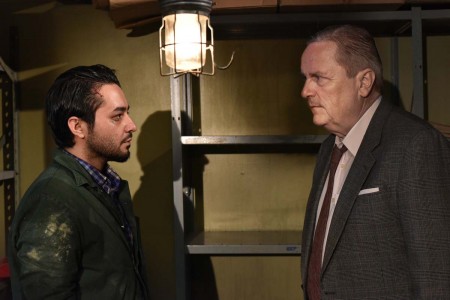
SAKARI KUOSMANEN, SHERWAN HAJI
Crossing paths
In this new movie as in his last one (made in 2011)), Kaurismäki is working in his signature style, with his usual actors (or sad sacks from the same mold), deadpan dialogue, bright colors, dominant blues and greens, direct lighting on actors, sharp images, ironically clear camerawork and editing and bright live old fashioned rock music. But again there's a big change from the old Kaurismäki. The gloom is missing.
And we may miss that gloom, its quiet beauty and dry sadness. Some even think its absence a betrayal. But I would argue they are wrong, that the filmmaker is flourishing in this new mode, and has lost none of his chops. But there is, certainly, a new focus: Kaurismäki is looking at one of the worst problems we face: the global refugee crisis. While the superstar artist Ai Weiwei's wide-ranging documentary this year, Human Flow, exhaustively described this problem, it provided no solutions. The Finn has a simple one he's advancing in these films: let each of us light our own little candle. This may not be much. But half a loaf is better than none.
A friend who now lives in Sweden once explained to me, when we saw Kaurasmaki's film before Le Havre, Lights in the Dusk (2006) in Paris, how visiting Finland and meeting Finnish people had greatly enlarged his appreciation of the Kaurismäkian oeuvre and mood. But without that I've grasped one thing: this is one of the world's unique cinematic stylists. Before you decide what your reaction to this movie is, or say anything, I suggest you warm up on the language - not Finnish, that would take more time - but watch several more of his films. They will grow on you.
Initially the language may seem thin, minimal, parsimonious, but the more you see how distinctive and consistent his world is, the richer it becomes. They're full-on movies. What goes on is visual, narrative, psychological, musical. These movies are full of music, background music whose wonderfully seedy makers turn out to be right on screen. The Other Side of Hope is simply a continuation of a new direction, more "positive," if you like, perhaps the second in a trilogy about refugees, the first being the 2011 Le Havre (NYFF 2011 , about the port, and an African boy who washes up into it and is protected by a beat-up and impoverished old Frenchman who shines shoes. That's the bare bones of the story, but there are rich echoes and sounds. The Other Side of Hope has a grown-up Syrian refugee. Instead of a shiner of shoes, it has a shirt salesman who gets lucky and buys a run-down restaurant.
The style is pervasive, and the delight is in the typically deadpan depiction of Wikström (Sakari Kuosmanen), as he leaves his wife, and goes off in his big black Checker car. (To tune into this film is to notice that car, and then to love it: so simple, so solid, so perfect, so out of time). Slowly but surely, in a series of deft, minimal scenes, Wikström disburses his sales stock of shirts, enters a poker game, gets lucky, wins a bundle, and decides to buy a little restaurant called The Golden Pint. A good investment? Hell, no. It's been failing and the previous owner takes off to the airport owing the staff. Efforts at rebranding the place with sushi and other cuisines are quietly howling failures. (Lights in the Dusk was the end of Kaurismäki's "Loser Trilogy," but there is always a loser.) Pascal Mérigeau of Le Nouvel Observateur, cited on AlloCiné, writes of "the sublime parsimony of the shot that lasts only just as long as is necessary." This is true. Like Antonioni, Kaurismäki proves on film what Mies' dictum "Less is more" means. And Mérigeau goes on, "those notes of sad and smiling irony that belong only to this filmmaker and to none other, so hard in appearance, so sweet at their heart."
In Kaurismäki, success (and Wikström seems to be having, sort of, a string of them) has a way of looking much like failure. But conversely failure isn't that far from success. The filmmaker himself may be seen as the maker of a string of failures that, viewed more closely, are gems.
Meanwhile, we meet Khaled, the Syrian refugee (Sherwan Haji), who turns up on a boatload of coal, covered with black ash. He washes it off at a town public bath, a symbolic rebirth. He meets an Iraqi waiting to be granted status, Mazdak (Simon Al-Bazoon), and gets some advice germane to our filmmaker's world: look happy, he says; the sad sacks get sent home. But don't be smiling or laughing on the street: they'll think you're crazy. Indeed they will, here, of all places. If there's one thing we learn from Kaurismäki it's that Finns are deadpan sorts. The Arab actors fit the mold. Khaled has a serene, inexpressive manner. Like La Fontaine's reed, he bends, but does not break: he is repeatedly attacked by Finnish white nationalist bigots, but somehow he seems to survive. The court decides - with enormous irony - that Syria is in no danger (the local TV news shows the devastation and atrocity rife there) - and handcuffs Khaled to send him home to Aleppo tomorrow.
Khaled escapes, and hiding, is found by Wikström and hired to work in the Golden Pint. Wikström in effect adopts Khaled, hides, protects him, and gives him a fake ID a techie young man grinds out magically from a little machine as utilitarian in its more modern way as the Checker car.
Like Wikström, Khaled is selfless too, because his concern isn't so much for himself as for his sister Miriam (Niroz Haji), who has disappeared, while all the rest of their family were killed in a bombardment. He is convinced she is alive somewhere, and is bent on finding her. Marzak's cell phone is the opening conduit in a new version of "le téléphone arabe": passing news by word of mouth. It works. This is an upbeat story with a difference, because while there is hope for Miriam, Khaled is still the target of the brutal racists.
This description does little justice to the film. One enjoys the tale of Wikström and his cohorts, savoring the Kaurismäkian style, seeing Khaled and Mazdak as a mere flutter under the surface, though what one savors is how subtly the two stories are gradually linked - the way the tale of a refugee's survival in a strange land is woven into a thoroughly Kaurismäkian display. In fact this shows Kaurismäki working in peak form. Some still complain that the upbeat mood and the concern with World Issues are betrayals, but somehow this film has gotten the best reception from critics the mournful Finn has ever had.
The combination of Kaurismäki and hope for refugees, however welcome or not, is a strange one, no doubt. But it seems to be working.
The Other Side of Hope/Toivon tuolla puolen, 100 mins., debuted at Berlin Feb. 2017 and has shown at 30 international festivals, including Telluride, Toronto, and the New York Film Festival at Lincoln Center 5 Oct. 2017. It opens in US theaters 1 Dec. 2017 and comes to the SF Bay Area 8 Dec.
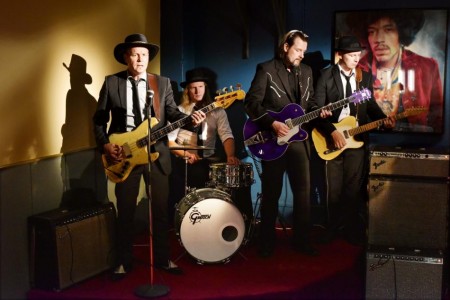
THE BAND
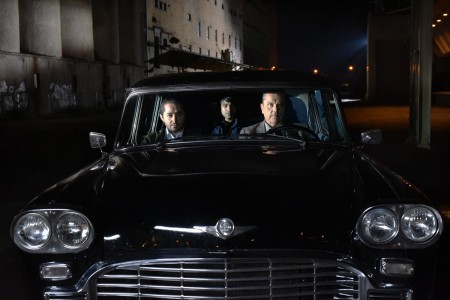
THE CHECKER
Last edited by Chris Knipp; 11-29-2017 at 08:05 PM.
-
WONDER WHEEL (Woody Allen 2017)
WOODY ALLEN: WONDER WHEEL (2017)
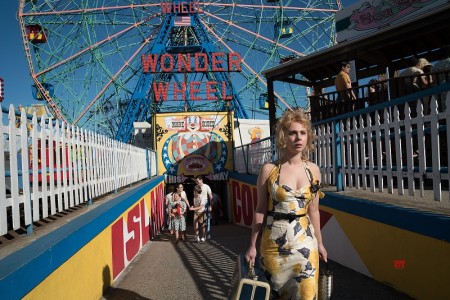
JUNO TEMPLE IN WONDER WHEEL
Muted tragedy on a garish stage
Another year, another Woody Allen movie written and directed by him. Since he cranks them out this way, and he's over eighty now, his record is great. You may think his best work, comedy classics like Bananas, Sleeper, and Everything You Wanted to Know About Sex, and the serious stuff, like Annie Hall, Manhattan, Crimes and Misdemeanors and Hannah and Her Sisters, is all in the past, the latest of these being 1989. But what about Matchpoint (2005, Metacritic 72%) Vicky Christina Barcelona (2007, Metacritic 70%), Midnight in Paris (2011, Metacritic 81%), and Blue Jasmine (Metacritic 78%), the last only four years ago? He gets great casts, he comes up with ingenious screenplays, and lately he's had the famous Italian cinematographer Vittorio Storaro adding an orange glow to his scenes.
The critics hated Wonder Wheel, but like all Woody Allen movies, it's worth looking at, and if it's a failure, it's an interesting one, different from the others. I have to repeat my favorite quote from the artist Robert Motherwell, that an artist's unsuccessful works are the necessary stepping stones to the good ones. We can't all produce nothing but masterpieces or hits, and if we don't keep working, we won't make anything. If Woody had taken a year off, there's no guarantee what he did next would be a zinger. More likely he'd just lose his touch, or get so depressed he couldn't work again. He's said making movies every year is all that keeps him from going suicidal.
Wonder Wheel seems perched uneasily between a corny Forties or Fifties Hollywood movie, an arty play by William Inge or Tennessee Williams, or a Greek tragedy. Isn't this a new combination, at least for Woody? Creating a feel that's both lurid and downbeat, the action is set at the declining Brooklyn beach playground of Coney Island in around 1950. Storaro gives it a glow that hovers between the natural and the unreal, a light that illuminates lovingly recreated postwar rides, games, and tacky signage, including large Pepsi and Coca Cola ads, as well as brightly lit actors in period clothing. The action is narrated for us, tellingly, by Mickey (Justin Timberlake), a young man who, though a lifeguard in the summer, when this takes place, is a student of literature at NYU with an interest in playwriting. He makes it clear he's looking for more complexity and variety that he got from traveling to Bora Bora - his favorite place in the wartime world tour with the Navy that forcibly interrupted his studies. When he meets the 25-year-old Carolina (Juno Temple) and falls for her, it's her wild story of escaping from life with a gangster husband that arouses him most. "You've been around the world," Carolina tell him. "Yes, he says, but you've been around the block." (More amusing exchanges like this might have enlivened the often dreary proceedings.)
The center stage action focuses on the 39-year-old former actress Ginny (an enjoyably gritty, unglamorous but beautiful Kate Winslet: and how could she not love this role?), who's stuck with the crude, alcoholic but on the wagon schlub Humpty (Jim Belushi), who runs a carousel, while she's stuck as a waitress at a seafood restaurant. But Ginny meets Mickey, and they initiate an affair which he enjoys, but she expects more of - escape from her dreary life. Carolina has appeared, after five years of alienation from her father, Humpty, on the run from the Mob who she's blabbed about to the feds. She hides out with Humpty and Ginny. There is the delusion that since they weren't speaking for so long, the Mobsters wouldn't come here to look for her, and she becomes a waitress while starting college classes to better herself as Humpty wants.
There's another character - a symbol of doom, a pointless distraction? - in the person of Ginny's young son from a previous failed marriage, Ritchie (Jack Gore), a nearly full-time arsonist, mostly too busy setting fires to attend school.
Much of this seems uninteresting in the recounting, even the appearances of Mobsters in beautiful gleaming black Cadillacs, carrying doom with them like the motorcycles in Cocteau's Orphée. They are coming to carry Carolina away. Mickey trashes his relationship with Ginny, and we may feel for Ginny, who, like Humpty, turns to drink when the shit hits the fan. That takes various forms: Richie setting more and more fires, Carolina luring Mickey away from Ginny, Ginny ruining her relationship with MIckey by giving him a ridiculously inappropriate expensive present bought with money stolen from Humpty's family savings meant for Carolina, Carolina's ominous disappearance - a whole lot goes wrong.
Woody whips up a tragic finale, but it fizzles. Few playwrights since O'Neill and Arthur Miller have been able to manage even a muted, pathetic modern tragic finale. But for a moment while her inexplicable son is setting fires, we witness the spectacle of a woman in flames in Kate Winslet's sadly striving Ginny, full of vigor but with nowhere to go. So at the end she and Humpty are back together again much as they were at the outset. There is a flirting with tragedy, but a lot of the focus on this complicated (but well-orchestrated) plot is, as so often with Woody Allen, on youth and age, and the latter's urgent need to get in bed with the former. Mickey likes that Ginny's decades his senior (though for the record, Winslet's really only six years older than Timberlake). Their common interest in theater is a bond, and he gives her as a present the then new book by the psychiatrist and Freud biographer Ernest Jones, Hamlet and Oedipus (published in 1949). But when he sees Carolina, it's love at first sight, which he believes in, along with romance and melodrama.
Richard Brody of The New Yorker notes that Allen "fills the story with wildly mixed emotions of pride and gilt, psychological clarity and moral horror," but under pressure of her migraines and failed dreams and guilt Ginny "loses her grip on reality," suffering "a form of madness that blots out the story's bitter truths and comes as a sort of deliverance." That's a nice way of seeing it, because it's a resolution: I felt the finale was just a muddle, though that's more like life than classical drama, and points to the experimental, sketchy, provisional nature much of Woody's often hasty, sometimes brilliant and successful movies - when they come together. Nearly everyone charms, or at least is vivid in Wonder Wheel. Timberlake is the drama's appealing, virile, yet faintly comic narrator-participant and engine. Winslet takes us on a heady, plucky dive into hope, eroticism and despair that's fun and exciting to watch, if only for a while.
Wonder Wheel, 101 mins, had its world premiere 14 Oct. 2017 as the Closing Night Film at the 2017 New York Film Festival. The US theatrical release began 1 Dec. 2017.
A partial Woody Allen Filmography:
Metacritic ratings, titles, and dates back to 2003:
46 Wonder Wheel 2017
64 Cafe Society 2016
53 Irrational Man 2015
54 Magic in the Moonlight 2014
78 Blue Jasmine 2013
54 To Rome with Love 2012
81 Midnight in Paris 2011
51 You Will Meet a Tall Dark Stranger 2010
45 Whatever Works 2009
70 Vicky christina Barcelona 2007
48 Scoop 2006
72 Matchpoint 2005
54 Melinda & Melinda 2004
43 Anything Else 2003
Last edited by Chris Knipp; 12-10-2017 at 11:36 PM.
-
ON THE BEACH AT NIGHT ALONE (Hong Sang-soo 2017)
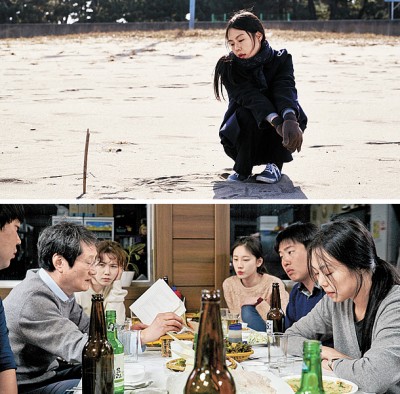
TWO SCENES FROM THE FILM
HONG SANG-SOO: ON THE BEACH AT NIGHT ALONE (2017)
A captivating woman
Eric Kohn of Indiewire calls this film "a fascinating sublimation of autobiography into Hong’s precise creative terms," and that's a good place to start. Obviously his films always have an autobiographical element, or anyway don't stray too far from personal possibility, just as they are, he has explained, largely improvised, the scenes not specifically planned in advance. They often take place at a location for a film, sometimes by the sea, and include a movie director. But this time the (quite marvellous and charming) actress Kim Min-hee, the center of attention, is playing a role that skirts a zone close to her life, and to his. The result is a heightened effect, and one of Hong's best efforts.
But apart from its typical scenes of eating and drinking and conversation, this is a dreamy, magical film, not a confessional. True, its center of attention, Kim Min-hee, was rumored to have recently had a scandalous affair with Hong himself, when he was then still married. They confirmed this earlier this year, and as a result she was dropped by her managers and represented in the Korean press "as some sort of homewrecker" (Bilge Ebiri, VillageVoice) - though her CV doesn't seem to show too much damage from this, since apart from being in Hong's two latest films, including this one, she also has the leading role in Park Chang-wook's The Handmaiden. Several years ago her collaboration on film with Hong was in the structurally more complex Right Now, Wrong Then (NYFF 2015). In On the Beach at Night Alone, Kim Min-hee not only gets to play some version of herself, she also demonstrates she is very much alive, and far too good to be blackballed for her misbehavior.
In this film, her character, Young-hee, also an actress who did just the same thing she did, with a director, with the same results, has just come back from spending a period in Europe to get away. The film begins with a short segment set in Hamburg, Germany, where Young-hee is spending time with an older, divorced woman friend, Jee-young (Seo Young-hwa), and they enjoyably wander a park and a market, visit a musician bookseller, and then have a somewhat awkward dinner with a German couple. Young-hee's time in Europe sounds different when she talks about it later back in Korea. She depicts herself as having had a peaceful, meditative time, but also a sexy time. But then her best moments with Jee-young come when they're jokily fantasizing, about living together, even about being a couple. And then there is the rather haunting, unusual moment when, about to walk across a bridge, Young-hee gets down on the ground and bows. She tells Jee-young later she was making a wish.
After that prelude, Young-hee is back in Korea in a series of scenes and conversations, some sober, some increasingly drunken, in Gangneung, a town on the eastern coast that people say has been voted the prettiest and most popular in the country. Standouts are one where she waits for a man (Jeong Jae-yeong) for an hour in a little coffee shop. He seems to have some connection with her, but the woman who runs the shop turns out to be more than his "friend," and in a series of very awkward social moments begins ordering him to prepare food, to sort the beans. Later Young-hee has a couple of sprightlier scenes, well lubricated by alcohol, in which she speaks with abandon about herself and about life. This movie could exist just so we can watch Kim Min-hee in action bringing this character, who may or may not resemble Kim Min-hee herself, into action. As Justin Chang wrote for the Los Angeles Times, this movie, if less structurally and conceptually complex than other recent ones, "is more than worth seeing for Kim’s exposed nerve endings alone," as well as its unaccustomed shift in mood toward the surreal.
As some of her interlocutors tell Young-hee, she must not stop acting, there will be roles for her, and she is beautiful, more than others, amusing, delightful, unpredictable: captivating. Two scenes of her lying on the beach alone, as the surf comes up, bookend one final, fantastical, climactic sequence where the director, the one she had the affair with, is present, with others. She gets quite drunk, quite hysterical, almost screaming.
Drinking and periods of tipsiness are commonplace in Hong's movies, doubtless indeed in Korean culture, at least the branch of it represented. Drunken outbursts must thus be read as not embarrassing, but quite normal, and perhaps welcomed as revelatory, and afterwards, forgivable, and forgettable. Thus with Young-hee's screaming outburst. In the context it's a welcome aria, an opportunity to dot i's and cross t's, and above all to thank the director (Mun Seong-kun), who's there, for giving her his love (not to reproach him). Young-hee says some rude things to some of those present, but they seem to be taken in good spirit. The director then speaks, and has his drunken outburst, bursting into tears for the trouble he has caused Young-hee.
Those two scenes of Young-hee lying on the beach alone - asleep, when she is awakened by someone so she's not washed into the sea - are singled out by Eric Kohn of Indiewire as in key contrast to the usual chatty Hong Sang-soo scenes, related also, he thinks, to the moment when she drops down before the bridge to pray, and suggesting an "indefinable sense of longing, an added layer of metaphysical sadness enveloping the picture." Perhaps. But also, more specifically, the two parallel awakenings on the beach are a way of suggesting that the whole second sequence of Young-hee's greater drunken outburst and the director's reply, have been only a dream, and she has not really met with the director at all. It's a wish fulfillment fantasy, perhaps, providing closure she would have liked but hasn't had.
The greatest delight of Hong's films, which they share with the French Nouvelle Vague that is an obvious influence, is how they seem to catch life on the fly - and at the same time, fail to catch it. The particular delight of On the Beach Alone at Night is the way it records this fascinating actress in a whole range of moods, from quiet and pensive to aggressive and hysterical, all appealing and delightful, her mercurial character perhaps intermingling imperceptibly with the actual person, providing a version both sublime and a little ridiculous - a superb calling card should any other filmmaker want to consider hiring her, despite what the gossipy papers say.
On the Beach at Night Alone/ 밤의 해변에서 혼자 101 mins., debuted at the Berlinale 16 Feb. 2017 (where Kim won the Silver Bear Best Actress prize), and its Korean theatrical opening was 23 Mar. This is one of three new movies Hong made this year, along with The Day After (also included in the Main Slate of the NYFF) and Claire’s Camera. It showed in 14 other international festivals including the NYFF 8 Oct. 2017, with a limited US theatrical release (with reviews) on 17 Nov. It was screened for this review 22 Dec. 2017 as part of the Museum of Modern Art "The Contenders" series.
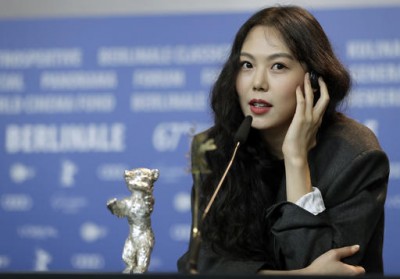
KIM MIN-HEE AT BERLIN WITH THE SILVER BEAR BEST ACTRESS AWARD
Last edited by Chris Knipp; 12-24-2017 at 12:39 AM.
-
BEFORE WE FANISH (Kiyoshi Kurosawa 2017)
KIYOSHI KUROSAWA: BEFORE WE VANISH (2017)
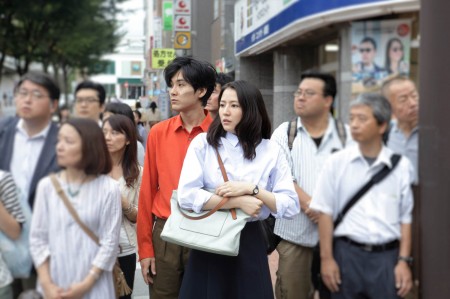
RYUHEI MATSUDA AND MASAMI NAGASAWA, CENTER, IN BEFORE WE VANISH
Dream deferred, love affirmed
Kiiyoshi Kurosawa is best known for his superb modern horror films, especially his 1997 Cure and 2000 Pulse. Reviewing the good but not quite so good one made in between, the ironically titled Bright Future , I wrote "Kurosawa like no other living director creates his own haunting and disturbing moods." He took a successful turn toward a more conventional family drama about a man ashamed of being out of work with his 2008 Tokyo Sonata. But in 2012 he came home in a new format, with a drawn-out but absorbing horror miniseries, "Penance", about murder and schoolgirls; its five episodes were shown in theaters and on Japanese TV; you can watch it online. Things have been uneven since then, as can happen with the prolific. Two overlong movies, Journey to the Shore and Daguerreotype (with Tahar Rahim, Olivier Gourmet, Mathieu Amalric, and Malik Zidi, all wasted, which I couldn't finish), came out in 2015 and 2016. But in between was the successful and more typical Creepy.
Well, this new one, based on a play (by Tomohiro Maekawa), is in between the two. It meanders too much, and doesn't seem to know how to grab us and hold us and move toward a climax. It's overlong too. But it's fun to watch, even amid cheesy special effects, Kurosawa's mastery of odd atmosphere, his way with young characters. One settles in comfortably for the work of a real pro, and winds up with a mystical and meditative work that plays with Eighties sci-fi.
What happens is a very low keyed alien invasion but it begins, as if influenced by American blockbusters' penchant for high-octane openings, with the violent, bloody murder of a family, and then Akira (Yuri Tsunematsu), the teenage daughter, appears walking down the street splattered with gore. But there are several other stories. There is the journalist, Sakurai (Hiroki Hasegawa), who, though he insists his interest is more important things, is sent in to follow up on the killings, and then he is approached by a loose-limbed, kind of crazy young man called Amano (Mahiro Takasugi) who offers to be Sakurai's "guide." (Takasugi does some falls and slides that are very graceful; and he's not the only one.)
An illustrator who works at home, Narumi (Masami Nagasawa) finds out her estranged husband, Shinji (Ryuhei Matsuda), has come back from a walk helpless, with loss of memory and incomprehension of basic tasks and ideas. This delights Narumi, who had grown to hate Shinji. Now that he's robed of most of his personality, though his helplessness can be a bit annoying, he becomes like a cuddly doll for her, or a playful reminder of all she loved about him originally.
The restored affection of Narumi and Shinji turns out to be the real unifying thread of a movie that instead of being primarily about alien invasion or apocalypse ends with a focus on the redeeming power of love. What helps this, perhaps the subtlest note, is that for a while we may imagine that maybe Shinji only thinks he's been invaded by an alien. He has, but this invasion turns out to be benign; the aliens are moved by what they find and change their minds. This is a hint of something dealt with in more detail in Nicolas Roeg's The Man Who Fell to Earth: the fact that life on earth can change a guy. Roeg's film meanders too, but it treats some of these themes more richly and, of course, has David Bowie. To do him justice, though, Ryuhei Matsuda looks rather like an alien too, at least from certain angles: perfect, but just a skosh off..
Sometimes Sinji's questions sound like mockery of human politics and philosophy. He also starts insisting that he is an alien, come as part of a takeover. He must absorb - like Invasion of the Body Snatchers , certain human concepts. He's not the only one to do this, and they do it by asking a few questions to get the person focused on an idea, and then touch their forehead, whereupon they generally collapse from the loss, which may be debilitating - or freeing. When Narumi's boss at work has his concept of work taken over, he and his colleagues merrily go about destroying the office.
There isn't very much violence, or rather it simply isn't effective as, say, in Cure, where each successive death is at once a shock and a confirmation; actually Akira goes on being very violent, killing people who annoy her wholesale with whatever weapons come to hand. They emit flashes and look suspiciously like Fifties sci-fi movie ray-guns at times: but Kurosawa clearly intends this playful allusion to more naive and simpler cinematic future-worlds.
Before We Vanish doesn't always know what it wants to be (Cure and Pulse, for that matter Tokyo Sonata, never deviate). Kurosawa may have chosen the play because it seemed germane to former interests. When the people invaded by aliens touch a forehead and the person drops to the ground, it echoes earlier, more powerful and haunting Kurosawa films. But the trouble is he has apparently expanded the play, when he ought to have made it leaner and more powerful. There are many amusing or enjoyable or even thought-provoking moments here, but the action is meandering, rather than suspenseful, and the result isn't the audience-pleaser that the director's best work has been.
Before We Vanish/散歩する侵略者 (Sanpo suru shinryakusha), 129 mins., debuted at Cannes in May 2017; it was included in at least 14 other international festivals, including the New York Film Festival (30 Sept. 2017). Its US theatrical debut, from Super LTD, begins 2 Feb. 2018, in NYC at Lincoln Center and IFC Center, and also in LA.
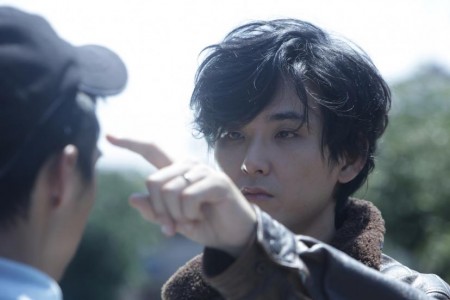
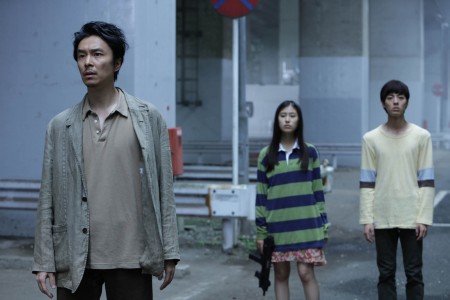
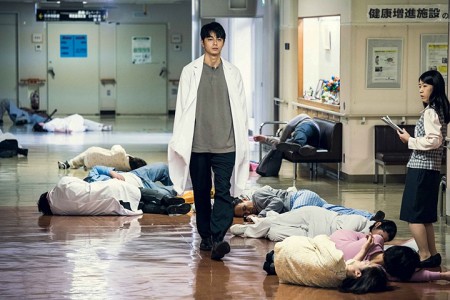
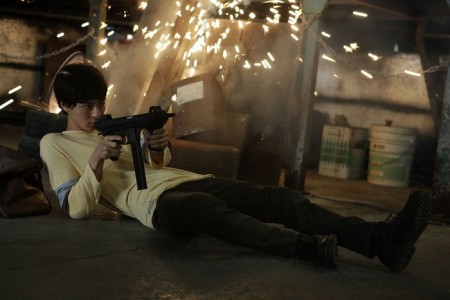
Last edited by Chris Knipp; 02-10-2018 at 02:30 PM.
 Posting Permissions
Posting Permissions
- You may not post new threads
- You may not post replies
- You may not post attachments
- You may not edit your posts
-
Forum Rules





 Reply With Quote
Reply With Quote

















Bookmarks